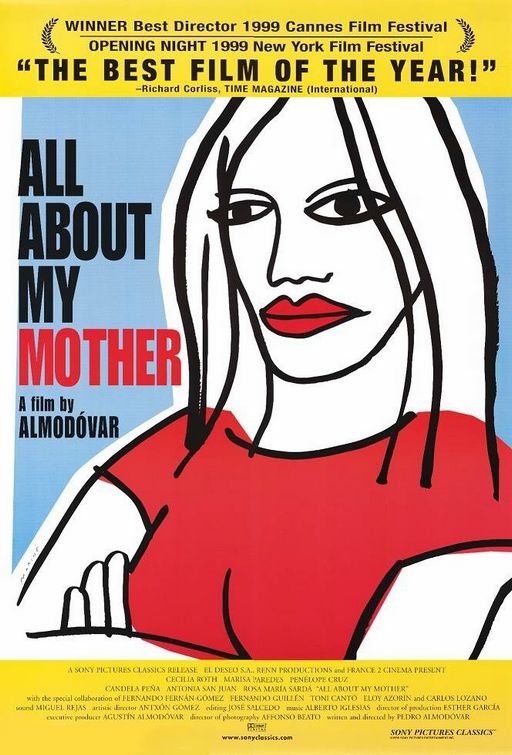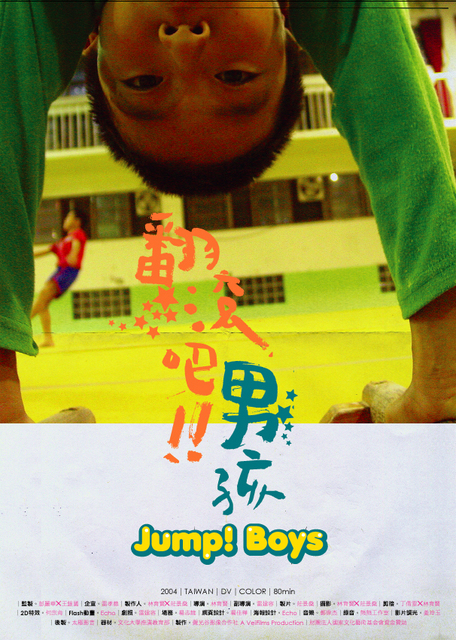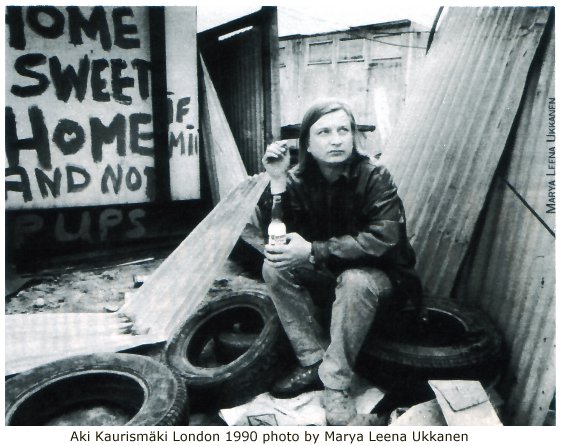地点(Venue):Room350
All About My Mother (
Spanish: Todo sobre mi madre) is a
1999 Spanish drama film written and directed by
Pedro Almodóvar. The screenplay deals with complex issues such as
AIDS,
transvestitism,
faith, and
existentialism.
The plot originates in Almodóvar's earlier film
The Flower of My Secret which shows student doctors being trained in how to persuade grieving relatives to allow organs to be used for transplant, focusing on the mother of a teenager killed in a road accident.
【故事大纲】
《我的母亲》/《论尽我阿妈》/《关于母亲的一切》
西班牙导演阿尔莫多瓦1999年的作品。阿尔莫多瓦的电影中总是充满了各种极端的因素——抢劫,敲诈,
毒品,
妓女,疯狂的暴力和
性爱,对
宗教的怀疑,同性恋,易装癖,以至于各种明亮艳俗的色彩。但这些因素不可思议地以一种看似平淡然而优雅平静的方式组合起来,就像波澜不惊的水面下有暗流涌动,只有身处其中才能有所感应。能欣赏阿尔莫多瓦的人一定是细腻敏感的。尽管他的作品中很难找到我们所认为的那种“正常”人和“正常”生活,可是他讲的故事总能真切地深入到人的心灵中最幽深曲折的角落,似乎剧中人和你我存在着天然的割不断的联系。电影叙事的手法是平实的,好像在对观众说:“你们看,这就是生活,不仅是她们的,而且是我们的生活。”
Synopsis
The film centers on Manuela, a
Nurse who oversees donor organ transplants in Ramón y Cajal Hospital in
Madrid and single mother to Esteban, a
teenager who wants to be a
writer.
On his seventeenth birthday, her son Esteban is hit by a car and killed while chasing after actress Huma Rojo for her autograph following a performance of
A Streetcar Named Desire, in which she portrays
Blanche DuBois. Manuela has to agree with her colleagues at work that her son's heart be transplanted to a man in
La Coruña. After traveling after her son's heart, Manuela quits her job and journeys to
Barcelona, where she hopes to find her son's father Lola, a
transvestite she kept secret from her son, just as she never told Lola they had a son.
In Barcelona, Manuela reunites with her old friend Agrado, a warm and witty
transsexual prostitute. She also meets and becomes deeply involved with several characters: Rosa, a young nun who works in a shelter for battered prostitutes and is pregnant by Lola; Rosa's mother; Huma Rojo, the
actress her son had admired; and the drug-addicted Nina Cruz, Huma's co-star and lover. Her life becomes entwined with theirs as she cares for Rosa during her pregnancy and works for Huma as her personal assistant and even acts in the play as an
understudy for Nina during one of her drug abuse crises.
On her way to the
hospital Rosa asks the taxi to stop at a
park where she spots her father's
dog and then her own father, who suffers from
Alzheimer's; he does not recognize Rosa and asks for her age and height. Rosa dies of
AIDS, which she got from Lola: Lola and Manuela finally reunite at Rosa's funeral. Lola (whose real name is Esteban), who is dying from AIDS, talks about how she always wanted a son, and Manuela tells her about her own Esteban and how he died in a car accident. Manuela then adopts Esteban, Rosa's child, and stays with him at Rosa's parents' house. The father does not understand who Manuela is, and Rosa's mother says it's the new cook, who is living here with her son. Rosa's father then asks Manuela her age and height.
Manuela introduces Esteban (Rosa's son) to Lola and gives her a picture of their own Esteban. Rosa's mother spots them from the street and then confronts Manuela about letting strangers see the baby. Manuela tells her that Lola is Esteban's father; Rosa's mother is appalled and says: "That is the monster that killed my daughter?!".
Manuela flees back to Madrid with Esteban; she cannot take living at Rosa's house any longer, since the grandmother is afraid that she will contract AIDS from the baby. She writes a letter to Huma and Agrado saying that she is leaving and once again is sorry for not saying goodbye, like she did years before. Two years later, Manuela returns with Esteban to an AIDS convention, telling Huma and Agrado, who now run a stage show together, that Esteban had been a miracle by not inheriting the virus. She then says she is returning to stay with Esteban's grandparents. When asking Huma about Nina, she becomes melancholy and leaves. Agrado tells Manuela that Nina went back to her town, got married, and had a baby.
Almodóvar dedicates his film "To all actresses who have played actresses. To all women who act. To men who act and become women. To all the people who want to be mothers. To my mother."
Almodovar recreates the accident scene from
John Cassavetes's
Opening Night as the epicenter of the dramatic conflict.
【导演简介】
佩德罗·艾慕杜华(
阿莫多瓦)
1949年9月24日,佩德罗·
阿莫多瓦出生在西班牙南部拉曼彻地区的一个名叫Clzada de Calatrava的小镇上。由于父亲的贩酒事业经营不善,阿莫多瓦的童年过得十分贫苦。八岁时,他随家人搬到艾克斯杜雷马杜拉省,并在那里进入教会学校学习。他开始迷恋电影,同时电影也给了他最大的安慰。 十六岁那年,阿莫多瓦放弃了进入修道院大学的机会,离开家乡,孤身一人前往马德里,心中只有一个明确的目标:到马德里去学习并拍摄电影。但当时在佛朗哥的强权政策下,国立电影
艺术学院已经被迫关闭。因此阿莫多瓦也只能一边靠打工维持生计,一边自学电影的基本理论。尽管60年代仍然是佛朗哥独裁当道的时期,但来自外省的少年阿莫多瓦还是深深地爱上马德里这座充满文化和自由气息的城市。不久后,阿莫多瓦在西班牙国家电话公司得到了一份正式的工作。这份工作不但使阿莫多瓦积攒购买了一架超八摄影机,开始拍摄一系列家庭手工式的地下电影作品,而且让他接触到西班牙众多的中产阶级家庭,正是他们的悲伤和快乐,为阿莫多瓦日后的创作提供了大量宝贵的素材和灵感。阿莫多瓦在国家电话公司整整工作了12年,在这12年中,他形成了自己独特而固定的生活模式。白天为众多客户工作服务,融入普通百姓的生活,而在晚上和休息日,他就开始了多彩的创作生活。除了写作拍摄超八厘米短片外,阿莫多瓦还为地下刊物创作小说和漫画,参加业余剧团的演出,甚至还组织了一支戏谑模仿他人作品的朋克乐队。 1975年,统治西班牙近半个世纪的独裁者佛朗哥去世,一个新的时代到来了。在这种大的背景下,阿莫多瓦的创作在这个刚刚重享自由的国家里展现出人们已经少有的激情。在适逢西班牙民主过程最高潮的1980年,他的第一部剧情长片《佩比、露西、伯姆和其他姑娘们》一经公映,就引起了巨大的反响。影片大胆尖刻地以黑色幽默的形式讲述着西班牙
社会中的性、暴力和变态,同时也赞美着人与人之间的友谊、爱情以及由此所带来的欢娱和快乐。阿莫多瓦在此后的《激情迷宫》、《黑暗的习惯》和《为什么我命该如此》等80年代初期作品中,以尖锐的目光、戏谑的手法、饱满的激情批判着专制封建的社会制度和没落腐朽的道德体系,充分展现出西班牙人民被压抑了四十多年的地中海式的自由精神。在西班牙,这些影片受到了广大观众格外的青睐和钟爱,因此阿莫多瓦的作品不但在艺术上有其独特的风格和深刻的内涵,而且商业上也有着强大的号召力。 1986年,阿莫多瓦推出了半自传式的电影《欲望的法则》,这部大胆而刺激的作品除了受到广泛注意外,还顺利地打开了他在美国的电影市场。随后,他创建了自己家族的电影企业“欲望无限”公司。在80年代西班牙电影工业受到美国巨大冲击而严重衰退的时候,由该公司出品的阿莫多瓦作品却都能屡创佳绩。1987年的《濒临崩溃边缘的女人》、1989年的《捆着我、绑着我》和1991年的《高跟鞋》都是西班牙电影有史以来最卖座的影片。这些电影绝非阿莫多瓦向商业献媚的滥俗之作,都是在保持其独特个人风格的同时,深刻地把握有关人性的主题,因此具有感染更多观众的普遍意义。80年代末期,阿莫多瓦在迎来自己艺术创作高峰的同时,他也成为西班牙全国上下宠爱的“电影国宝”以及欧洲最具国际意义和票房号召力的电影大师。 进入90年代,阿莫多瓦丝毫没有放慢创作的脚步,怪异讽刺的《奇卡》、朴实细腻的《我的神秘之花》、激情澎湃的《颤抖的欲望》及我们在开头提到的那部深刻感人的《关于我母亲的一切》,这些风格迥异的作品都验证出这位大师旺盛的创造力和处理不同题材影片的卓越才华。 从最早的一部《佩比、露西、伯姆和其他姑娘们》到最近的《关于我母亲的一切》的20年中,阿莫多瓦形成了自己独有的电影风格和电影美学。在其作品热闹而绚丽的外表下,阿莫多瓦一直冷静地关注着这个世界,他把目光投向普通人的平凡生活和社会的阴暗角落,从中感悟人性的力量与缺憾,一面以最直接的手段表白着人类的爱恨和情欲,另一面激进地鞭挞着种种传统而腐朽的“社会道德”。与其他男性导演不同,阿莫多瓦始终关注着女性,他以一种理解和关怀的姿态,细腻温情地刻画着女性敏感的精神世界。在阿莫多瓦的作品中,女性生活在枯燥无味的现实中,孤独而寂寞,丰富的感情和美好的梦想无所寄托,只能坚强地在绝望和痛苦中挣扎和反抗。他在对女性的善良天性和她们之间的无私友谊进行极力赞美的同时,毫无掩饰地批判了那些懦弱、虚伪并且对女人造成极大伤害的男人们。除了特别热中女性题材,阿莫多瓦还是一个敏锐的社会学家,宗教、凶杀、毒品、偷窥、家庭暴力、婚外恋、同性恋、变性、媒体侵犯隐私等各种社会现象在他的作品中都有所展示。由此可见,在阿莫多瓦那些看似荒诞的情节背后,隐藏着生活巨大的真实。 从电影的表现形式来看,阿莫多瓦在以沉重、晦涩著称的欧洲艺术影坛树立了自己个性鲜明的旗帜。他以嘲弄、戏谑的姿态,肥皂剧甚至闹剧的形式,面对每一个普通观众,讲述着一个个怪异可笑但发人深省的通俗故事。在阿莫多瓦的故事中不但有卡通般鲜明个性的人物,戏剧式的矛盾冲突,更有诸如凶杀、绑架、性场面甚至变性人等各种刺激观众的商业因素。加上他所特有的西班牙式的黑色幽默,使观众在品尝现实、感悟人生之余,增添了一丝或欣喜或苦涩的微笑。这些都使得阿莫多瓦的电影在具有深刻、严肃主题的同时,又存在着很强的观赏性和娱乐性。 而谈到他作品中的电影美学,就必须注意他那独树一帜的电影色彩。观众们第一次接触阿莫多瓦的作品都会为他那些艳俗而缤纷的色彩搭配所惊讶。如以传统美学评判,这些色彩的运用实在肤浅且不相协调。而阿莫多瓦这种对色彩看似恣意的使用恰恰一方面与他影片中狂野混乱的情景相得益彰,另一方面也体现出西班牙人民对绚丽色彩和生命与激情的钟爱。阿莫多瓦在影片中精心设计搭配着那些鲜艳、夸张的色彩,并赋予它们不同意义的象征。红色是阿莫多瓦电影最明显的标志,它象征着生命的动力、对爱情的渴求和不可抗拒的情欲,更是女性形象的代表。因此,在《濒临崩溃边缘的女人》、《高跟鞋》、《关于我母亲的一切》等重要作品中,红色都起到了举足轻重的作用。即使在影片的布景上,阿莫多瓦也格外注意色彩的搭配,就连家庭的室内装饰都令人难以想象地运用了各种鲜艳的颜色,除造成强烈的视觉冲击外,更隐喻着看似平静的社会中所存在的各种怪诞的问题。 阿莫多瓦在少年时代曾经这样描述过电影对他的意义:“电影就好象一扇梦幻的窗户,我很确定我从中看到的世界比我生活的世界更为有趣。”阿莫多瓦,这个西班牙电影梦幻的编织者正保持着饱满的激情和难以想象的创造力,以更为成熟、更具个性的手法,用更浓重瑰丽的色彩描绘着人类的情感与欲望,创作着观众们更值得期待的作品。
Director
The most internationally popular and important Spanish director since Luis Bunuel, Pedro Almodovar fled the stifling Roman Catholicism of his provincial La Mancha at the age of 17 to do battle with the windmills of Madrid. Lacking the money to enter college, he peddled books and made jewelry before settling into a decade-long run as a clerk at the National Telephone Company during which he contributed comic strips and stories to underground magazines like STAR, VIBORA and VIBRACIONES. As the most visible exponent of "la movida" (the cultural ferment in Madrid post-Franco), he would eventually act with the avant-garde theater group Los Goliardos, meeting actors like Carmen Maura and Antonio Banderas who would become key players in his movie repertory company. Additionally, he would publish parodic memoirs under the pen name 'Patti Diphusa' (a fictitious international porn star) in LA LUNA and record and perform (in drag) with his own band (Almodovar and McNamara), although not before shooting his first Super-8 shorts, beginning with "Dos Putas, o Historia de Ampor que Termina en Boda" (1974).
While other directors of his generation were making somber films about the Franco years, Almodovar made the conscious intellectual decision to never allude to the specter of the generalisimo, recording instead the vibrant explosion of wild behavior and hedonism expressed in the giddy rush of freedom following the old fascist's death in 1975. In fact, his first mainstream feature "Pepi, Luci, Bom and Other Girls Like Mom" (1980), shot in 16mm and blown up to 35mm, was an instant success, due in large part to the marked absence of Franco's shadow. Almodovar continued to develop his eye-popping colorful style, making affectionately off-the-wall movies chronicling the dark, bawdy and ultimately lonely misadventures of people living on the fringes of society--heroin-shooting nuns in "Dark Habits" (1983); a speed-addicted cleaning woman in "What Have I Done to Deserve This?" (1984); a murderous bullfighter in "Matador" (1986); and lovelorn homosexuals and transsexuals in "Law and Desire" (1987), a film which drew fire for its depiction of unprotected gay sex.
Though openly gay, Almodovar took umbrage at what he considered the pejorative label of "gay filmmaker", arguing that the homosexual sensibility in his films did not make them "gay films", but rather films depicting universal passion to which both homosexuals and heterosexuals could relate. The director successfully transcended these early attempts to classify him, and when people refer to him today as the undisputed leader of the New Spanish Cinema, there is no tag regarding his sexual orientation. Funny, outrageous, sexy, even kinky, his early movies driven by headstrong (and high-strung) heroines earned him a reputation as a fine director of women (a contemporary George Cukor) and culminated in the wackily exuberant farce "Women on the Verge of a Nervous Breakdown" (1988). Almodovar painted the manic Madrid of the 80s as a playground for wit--above all, women's wit--and audiences responded enthusiastically, making it the most successful film in Spanish box-office history, one that won international acclaim and an Academy Award nomination for Best Foreign Film.
Of all his films to date, "Women" faired the best with Americans, grossing a phenomenal $7 million in the States. Almodovar's attempt at high comedy a la "How to Marry a Millionaire" (1953) resulted in what he called an "absolutely white" movie covering 48 hours in the lives of several women who are so hysterical, they don't have time for sex and drugs. Though seemingly at odds with the uninhibited signature of his earlier work, the lack of oral sex acts and dope that made it in the words of leading lady Maura "a film that our nephews will be allowed to see" also made it more accessible to conservative US audiences. His next film "Atame!/Tie Me Up! Tie Me Down!" (1990), however, earned an X rating for its one prolonged sex scene, which showed the two lovers only from the waist up and focused primarily on the woman's sexual fulfillment. Perhaps the success of "Women" had made him a target of the MPAA, but the advocacy of William Kunstler on the picture's behalf did not dissuade the ratings board. The X stood, causing the incensed director to compare MPAA's tactics to fascist techniques under Franco.
"Tie Me Up! Tie Me Down!", Almodovar's fifth and last movie with Banderas, grossed $4 million in the States but since then his US box office has been in a downward spiral. Americans loved the campy "Women" but responded less enthusiastically to the kidnapping central to "Tie Me Up!". "High Heels" (1991) started out in the helmer's typically irreverent, wacky style but ran out of steam about halfway through, and the lengthy rape scene of "Kika" (1993), which earned the film its NC-17, did not strike US audiences as funny, once again causing the director to decry Americans as puritanical and lacking a sense of humor for their inability to see rape as a laughing matter. "The Flower of My Secret" (1995), while true to Almodovar's typically sympathetic focus on the plight of the contemporary Spanish woman, also revealed a more mature artist at work. Audiences expecting the enfant terrible's familiar, off-beat black humor saw a return to the masterful high comedy of urban life, accompanied by the sad notes of resignation and compromise that signaled a new austerity.
With "Live Flesh" (1998), Almodovar moved beyond his stance of never referring to the Franco years while showing he could fuse visual and sexual anarchy with the most elegant of plots. He also for the first time filmed material which he had not originated, loosely adapting Ruth Rendell's novel into a completely Spanish sensibility. The movie opens with the birth of Victor on a bus in 70s Madrid, its streets bare because of the restrictions of the Franco regime, and comes full circle with the birth of Victor's son 26 years later in the middle of a Madrid street choked with traffic, symbolic of the better life Victor's son will enjoy in a democratic Spain. In an ominous note for Spanish audiences, the voice heard announcing the state of emergency at the picture's beginning belongs to Manuel Fraga Iribane, formerly Franco's minister of information and grand old man of the conservative party ruling Spain today. Almodovar's concerns about that new right-wing government prompted his use of this device to remind viewers that "we are not so far from it (the awful past)."
Though American audiences have not embraced the more political and sober Almodovar, the change of mood has proved popular in Spain, where critics who previously attacked the unevenness of his plotting and superficiality of his characters proclaimed "Live Flesh" a masterpiece, qualifying it with adjectives like consistent and cohesive. No longer the overgrown kid who sprang from the thick of Madrid's anything-goes night life, armed with a hand-held camera, to record the intoxication of Spain's post-Franco freedoms, he has reinvented himself triumphantly as a consummate stylist with a serious touch. The departure from his wildly comedic storylines represents the evolution of a director who needed to tackle fresh and dangerous territory to escape becoming mannered. What interests Almodovar as he enters this period of maturity is a narrative that truthfully reveals his characters' emotions, and the fully-developed masculinity of "Live Flesh" that replaces the crude and flat males of his recent work is just one indication of an auteur beginning to demonstrate complete command of the art form.
【All About My Mother获奖记录】Awards
Academy AwardsBest Foreign Language Film (won)
BAFTA AwardsBest Film Not in the English Language (won)
Best Direction (Almodóvar, won)
Best Screenplay - Original (Almodóvar, nominated – lost to Being John Malkovich, Charlie Kaufman)
Golden Globe AwardsBest Foreign Language Film (won)
Goya AwardsBest Actress (Roth, won)
Best Cinematography (nominated – lost to Goya in Bordeaux)
Best Costume Design (nominated – lost to Goya in Bordeaux)
Best Director (Almodóvar, won)
Best Editing (won)
Best Film (won)
Best Makeup and Hairstyles (nominated – lost to Goya in Bordeaux)
Best Original Score (Iglesias, won)
Best Production Design (nominated – lost to Goya in Bordeaux)
Best Sound (won)
Best Supporting Actress (Peña, nominee – María Galiana, Alone)
Best Screenplay - Original (Almodóvar, nominee – lost to Alone, Benito Zambrano)
Boston Society of Film Critics Award for Best Foreign Language Film (winner)
British Independent Film Award for Best Foreign Language Film (winner)
Butaca Award for Best Catalan Film Actress (Candela Peña, winner)
Cannes Film Festival Best Director Award (winner)
[7]Cannes Film Festival Prize of the Ecumenical Jury (Pedro Almodóvar, winner)
[7]Chicago Film Critics Association Award for Best Foreign Language Film (winner)
César Award for Best Foreign Film (winner)
David di Donatello for Best Foreign Film (winner)
Jameson People's Choice Award for Best European Director (winner)
European Film Award for Best European Film (winner)
European Film Award for Best European Actress (Cecilia Roth, winner)
GLAAD Media Award for Outstanding Film in Limited Release (nominee)
Independent Spirit Award for Best Foreign Language Film (nominee)
London Film Critics Circle Award for Foreign Language Film of the Year (winner)
Los Angeles Film Critics Association Award for Best Foreign Language Film (winner)
National Board of Review Award for Best Foreign Language Film (winner)
New York Film Critics Circle Award for Best Foreign Language Film (winner)
Premios ACE Award for Best Film (winner)
Premios ACE Award for Best Actress - Cinema (Cecilia Roth, winner)
Premios ACE Award for Best Supporting Actor - Cinema (Fernando Fernán Gómez, winner)
Premios ACE Award for Best Supporting Actress - Cinema (Marisa Paredes, winner)
Satellite Award for Best Foreign Language Film (winner; tied with
Three Seasons)
Filmography
Year
English title
Original title
Notes
1980
Pepi, Luci, BomPepi, Luci, Bom y Otras Chicas del Montón
* Original Script
1982
Labyrinth of PassionLaberinto de Pasiones
* Original Script
1983
Dark HabitsEntre Tinieblas
* Original Script
1984
What Have I Done to Deserve This?Que he hecho yo para merecer esto
* Original Script
1986
MatadorMatador
Original script with Jesús Ferrero
1987
Law of DesireLa Ley del Deseo
* Original Script
Berlin International Film Festival: Winner of the first
Teddy Award1988
Women on the Verge of a Nervous BreakdownMujeres al Borde de un Ataque de Nervios
* Original Script
Goya Award for Best PictureNominee of the
Academy Award for Best Foreign Language Film1990
Tie Me Up! Tie Me Down!¡Átame!
* Original Script
1991
High HeelsTacones Lejanos
* Original Script
César Award:
Best Foreign Film1993
KikaKika
* Original Script
1995
The Flower of My SecretLa Flor de Mi Secreto
* Original Script
1997
Live FleshCarne Trémula
* Script with Ray Loriga and Jorge Guerricaechevarría, loosely based on
Ruth Rendell’s novel
1999
All About My MotherTodo Sobre Mi Madre
* Original Script
Winner of the
Academy Award for Best Foreign Language FilmCannes Film Festival: Award for
Best Director[23]Cannes Film Festival: Audience Award
BAFTA Award:
Best Film Not in the English Language,
Best Original ScreenplayCésar Award:
Best Foreign FilmChicago Film Critics Association Award for Best Foreign Language Film
Seven
Goya Awards (including Best Picture, Best Actress and Best Director)
2002
Talk to HerHable Con Ella
* Original Script
Winner of the Academy Award for Best Original Screenplay
BAFTA Award:
Best Film Not in the English Language,
Best Original Screenplay (Pedro Almodóvar)
Golden Globe Awards:
Best Foreign Language FilmGoya Awards (Spain): Best Original Score (Alberto Iglesias)
Los Angeles Film Critics Association: Best Director (Pedro Almodóvar
2004
Bad EducationLa Mala Educación
* Original Script
New York Film Critics Circle Awards :Best Foreign Language Film
2006
VolverVolver
* Original Script
Cannes Film Festival Award for
Best Screenplay[27]Cannes Film Festival Award for
Best Actress (for the whole female cast)
[27]Goya Awards: Best Picture, Best Director, Best Actress in Leading Role, Best Supporting Actress, Best Original Music
National Board of Review Award for Best Foreign Film
2009
Broken EmbracesLos Abrazos Rotos
* Original Script
Nominee for
Golden Globe Awards:
Best Foreign Language Film进行方式:此社将与南方学院学生的电影研究社合作,由许通元、赵少杰、Kelly或罗友强老师主持,每星期定期选片后放上部落格让有兴趣的观众参考,影片播映完后,由当天主持与观众进行交流。
播放字幕:中文字幕(中日韩片)、英文字幕(欧美及其他)
详情请见:http://tuesfilm.blogspot.com/
免费入场。
欢迎电邮给您的朋友们!
星期二影社敬启










